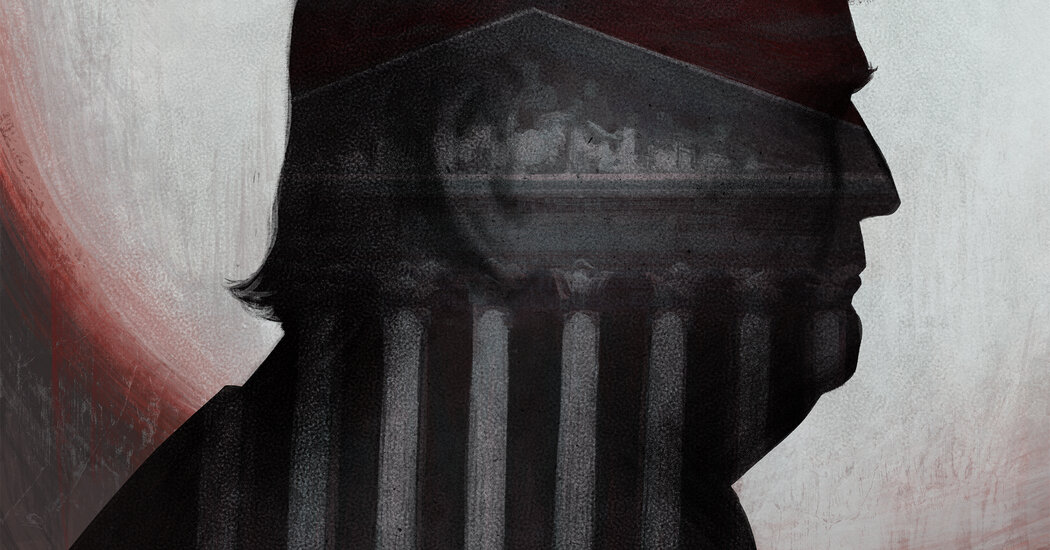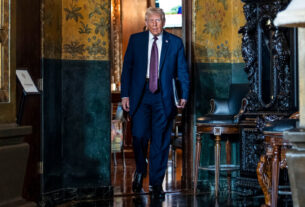If Donald Trump wins the White House this fall and has a chance to appoint a Supreme Court justice or two in the years that follow — by no means a certain prospect, but one that must be contemplated — his nominees are likely to be quite different than they were during his first term. Everything we know about Mr. Trump today suggests that he will take his judicial cues not from the conservative legal establishment, as he did previously, but instead from the conservative legal movement’s extreme fringes.
During the 2016 presidential campaign, Mr. Trump joined forces with the Federalist Society co-chairman Leonard Leo, who helped assemble a shortlist of conservative judges from which Mr. Trump pledged to select a replacement for Justice Antonin Scalia. Mr. Trump’s decision to publicly align himself with Mr. Leo helped settle the nerves of establishment Republicans who were skeptical of the candidate’s ideological bona fides, and played a significant role in the 2016 election. (One exit poll showed that among voters for whom Supreme Court appointments were the most important issue, 56 percent voted for Mr. Trump.) As president, Mr. Trump selected all his nominees — Neil Gorsuch, Brett Kavanaugh and Amy Coney Barrett — from versions of the shortlist, which he periodically updated.
In the past four years, however, Mr. Trump has soured on the conservative legal establishment. He was reportedly furious with lawyers at the White House and the Justice Department — many of them recommended to him by the Federalist Society — who were, in his view, insufficiently willing to help him overturn the 2020 election results. He felt similarly about Justices Gorsuch, Kavanaugh and Barrett, perceiving their refusals to entertain his various voter fraud cases as disappointing exhibitions of disloyalty.
As a result, Mr. Trump has changed his inner circle of lawyers. As of February, he was reportedly no longer speaking with Mr. Leo or the former White House counsel Don McGahn, two key cogs in his once formidable judicial confirmation machine. The Federalist Society credentials that were once essential for conservative lawyers aspiring to federal judgeships during Republican presidencies are, in Mr. Trump’s world, now apparently a liability.
This shift in Mr. Trump’s judicial brain trust could be disastrous for the country. The sort of far-right candidate who might now appeal to Mr. Trump for the Supreme Court, if confirmed, would make it even easier to overturn Warren court-era decisions that protect cherished constitutional rights. For all the court has already done to lose the public’s trust, the appointments of figures like these would erode whatever legitimacy the institution has left.
In March, Mr. Trump suggested that he’d update his Supreme Court shortlist for a potential second term — by the end of which Justices Clarence Thomas, Samuel Alito and Sonia Sotomayor would have celebrated their 80th, 78th and 74th birthdays — but he has yet to do so. In the meantime, the types of activists who are likely to have Mr. Trump’s ear are busy making lists of their own.
One proposal comes from AFA Action, an organization whose mission is “to align policy with biblical and constitutional principles.” Its list features three Trump-appointed federal appeals court judges: James Ho, best known for his unironic use of the phrase “woke Constitution”; Stuart Kyle Duncan, notorious for shrieking at student protesters during a talk at Stanford Law School; and Lawrence VanDyke, whose peers have described him, according to the American Bar Association, as “arrogant, lazy, an ideologue and lacking in knowledge of the day-to-day practice.” (In 2019, the association deemed him “not qualified” for judicial confirmation.)
From there, the list gets only more unhinged. It includes Kristen Waggoner, the president of the Alliance Defending Freedom, designated by the Southern Poverty Law Center as an anti-gay hate group; Morse Tan, the Liberty University law school dean who once opined that abortion since Roe v. Wade “makes the Holocaust look small by comparison”; and Mark Martin, a former state supreme court justice who is now the dean of a law school in North Carolina that has not yet been approved by the American Bar Association. (Mr. Martin, probably the most obscure name on the list, served as an informal adviser to Mr. Trump during his fight to overturn the results of the 2020 election.)
You might think that a Justice Ho or a Justice Waggoner wouldn’t significantly alter this Supreme Court’s ideological composition. Conservatives already have a supermajority, so even if a liberal justice were to retire or die during a second Trump term and be replaced with a conservative, the outcomes of Supreme Court cases might be no different.
But outcomes are only part of the story. Consider how the court, which exercises near total control over its docket, chooses to use its limited time and resources. It takes only four votes for the court to review a case, which means that if a fringe figure joined the court, he or she would need to convince just three other justices to consider radical legal theories that attack long-settled precedent. Such a court could entertain challenges to, for example, Miranda v. Arizona, which requires police to inform criminal suspects of their constitutional rights; Griswold v. Connecticut, which protects the freedom to use contraceptives; or Obergefell v. Hodges, which established the right to same-sex marriage less than a decade ago.
The judges on AFA Action’s list are radical not just in their ideology but also in their public behavior and their unorthodox approaches to the job. Judge Ho is an unabashed culture warrior, railing against the excesses of cancel culture in speeches that would not sound out of place in a Tucker Carlson monologue. Judges VanDyke and Duncan have raised eyebrows by putting out bizarre opinions in high-profile cases, sometimes stylizing their contributions as “alternative” opinions or their takes on what the majority opinion “should” have looked like. These attention-seeking stunts convey contempt for their colleagues as well as a presumption that their arguments are, in a sense, entitled to prevail.
The Supreme Court is already fighting an uphill battle to preserve what remains of its legitimacy. According to polling conducted in May, 61 percent of Americans disapprove of the court, and 56 percent believe its decisions are motivated “mainly by politics.” For any current justice who aspires to win back hearts and minds, one or more new colleagues who comport themselves like robed right-wing YouTubers would not be helpful.
The Supreme Court that Mr. Trump built has already fulfilled some of the conservative legal movement’s most important objectives: ending affirmative action, creating a right to carry guns in public and overturning Roe. Yet for all that Justices Gorsuch, Kavanaugh and Barrett have done to push the law to the right, Mr. Trump’s next nominees could push it much further. He needed only four years to transform conservative dogma into constitutional law and far-right ideologues into median justices. Four more years could start the cycle all over again.





